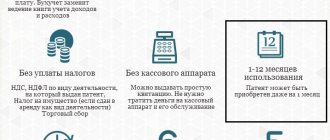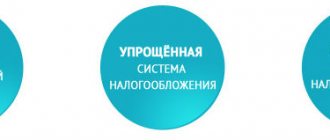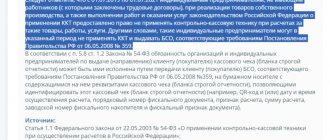UTII: the special regime has been extended until 2021
This is probably the most pleasant news for all “imputed” people.
As it was in 2020. The fact is that Federal Law No. 97-FZ dated June 29, 2012 (Part 8, Article 5) set the date for the abolition of UTII - January 1, 2020. And many single tax payers were seriously alarmed. After all, I had a little more than a year left to work at the imputation.
However, Federal Law No. 178-FZ dated June 2, 2016 (Article 2) extended the validity of UTII until January 1, 2021.
How it happened in 2020. This year and the next three ( until the end of 2020 ), you can safely continue to work on the “imputation”.
UTII: deflator coefficient has not been increased
The deflator coefficient K1 is involved in the calculation of the single tax. It allows you to adjust the taxpayer’s imputed income by the amount of inflation. The size of the coefficient is set annually for the next calendar year (clause 2 of the Order of the Government of the Russian Federation of December 25, 2002 No. 1834-r, paragraph 27, clause 2 of Article 11 of the Tax Code of the Russian Federation):
- by order of the Ministry of Economic Development of Russia no later than November 20 of the previous year;
- in another way (for example, by federal law) after November 20 of the previous year.
As it was in 2020. For the purpose of calculating UTII, Order No. 772 of the Ministry of Economic Development of Russia dated October 20, 2015 (hereinafter referred to as Order No. 772) provided for a deflator coefficient for 2016 equal to 2.083. However, in times of crisis, legislators decided not to increase the tax burden on business. Therefore, by Order of the Ministry of Economic Development of Russia dated November 18, 2015 No. 854, changes were made to Order No. 772, as a result of which K1 remained at the 2015 level - 1.798.
How it happened in 2020. Last year there was a lot of debate about whether K1 should be increased for 2020. The Russian Ministry of Finance even prepared a bill proposing a gradual increase in this indicator over 3 years:
- in 2020 – up to 1,891;
- in 2020 – up to 1,982;
- in 2020 – up to 2,063.
However, the proposal of the Financial Department was never accepted. And the deflator coefficient in 2020 remained the same as it was in 2016 (and in 2020) - 1.798 . The value of K1 was established by Order of the Ministry of Economic Development of Russia dated November 3, 2016 No. 698 and later did not change (Article 11 of the Federal Law dated November 30, 2016 No. 401-FZ).
UTII: established a new list of household services
As you know, certain types of business activities listed in clause 2 of Article 346.26 of the Tax Code of the Russian Federation are transferred to UTII. In particular, local authorities can introduce “imputation” on their territory in relation to household services (clause 1, clause 2 and clause 3 of Article 346.26 of the Tax Code of the Russian Federation). But the Tax Code does not specify which types of services are classified as household services. Therefore, a special list is used for these purposes.
By the way, this list is also necessary for regions that are introducing a zero tax rate on their territory for newly registered individual entrepreneurs. The so-called tax holidays. But notice! They do not apply to UTII, only to the simplified tax system and PSN.
As it was in 2020. Last year, types of household services were determined according to the All-Russian Classifier of Services to the Population OK 002-93 (OKUN).
How it happened in 2020. As of this year, OKUN OK 002-93 is no longer valid. Instead, new classifiers were put into operation, approved by order of Rosstandart dated January 31, 2014 No. 14-ST:
- All-Russian Classifier of Types of Economic Activities (OKVED2) OK 029-2014 (NACE Rev. 2);
- All-Russian classifier of products by type of economic activity (OKPD2) OK 034-2014 (KPES 2008).
But they do not include household services in a separate section.
In order for the taxpayer to know exactly whether he has the right to apply UTII for the line of business being carried out, the Government of the Russian Federation, in Order No. 2496-r dated November 24, 2016, listed all activity codes according to OKVED2 and service codes according to OKPD2, which are classified as household.
UTII: clarified the procedure for the transition from UTII to the simplified tax system
The UTII payer can voluntarily switch to the simplified tax system only from the beginning of the new calendar year (clause 1 of article 346.13 of the Tax Code of the Russian Federation). But if within a year he had to refuse the “imputation” due to the fact that:
- local authorities excluded the type of activity being carried out from those subject to UTII;
- local authorities have abolished UTII on their territory;
- the taxpayer stopped conducting an “imputed” type of activity and began working in an area that cannot be transferred to UTII;
- the taxpayer violated the requirements for the use of UTII,
then from the beginning of the month in which the obligation to pay the single tax was terminated, he can switch to the “simplified tax” (paragraph 4, paragraph 2, article 346.13 of the Tax Code of the Russian Federation). In this case, a corresponding notification is submitted to the tax authority.
As it was in 2020. The deadline for filing such a notice was not established by current legislation. Therefore, officials had to explain this point (letter of the Ministry of Finance of Russia dated September 12, 2012 No. 03-11-06/2/123).
How it happened in 2020. The former “imputed” person must submit a notification about the transition to the simplified tax system no later than 30 calendar days from the date of termination of the obligation to pay UTII.
Changes to UTII - 2020
Important changes to UTII
The deflator coefficient is frozen.
The deflator coefficient used to calculate the tax base for UTII for 2020 will be 1.798 (Article 11 of Law No. 401-FZ; Order of the Ministry of Economic Development of Russia dated November 3, 2016 No. 698). The same coefficient was used in 2015 (Order of the Ministry of Economic Development of Russia dated October 29, 2014 No. 685) and 2020 (Article 1 of the Federal Law dated December 29, 2015 No. 386-FZ; Order No. 772). New service classifiers. The All-Russian Classifier of Services to the Population (OK 002-93) OKUN (adopted and put into effect by the State Standard of Russia of June 28, 1993 No. 163) became invalid on January 1, 2017 (clause 6 of Order No. 14-st; letter from the Ministry of Finance of Russia dated 10/11/2016 No. 03-11-06/2/59090). Codes of types of activities for household services and codes of services related to household services are now determined in accordance with OKVED2 (OK 029-2014 (NACE Rev. 2) and the All-Russian Classifier of Products by Type of Economic Activities (OKPD2) OK 034-2014 (KPES 2008) (approved by Order No. 14-st; subparagraph 1, paragraph 2, article 346.26, paragraph 7, article 346.27 of the Tax Code of the Russian Federation).
In addition, the Government of the Russian Federation approved a list of codes for types of activities and services related to household (Order of the Government of the Russian Federation dated November 24, 2016 No. 2496-r).
Fixed payments for insurance premiums are included in expenses. Since 2017, individual entrepreneurs with hired personnel have the right to reduce the amount of UTII (within 50%) calculated for the tax period by the amount of fixed payments for insurance premiums paid both for their employees and for themselves (subclause 1, clause 2 Article 346.32 of the Tax Code of the Russian Federation as amended by Federal Law dated June 2, 2016 No. 178-FZ).
Previously, they were deprived of the opportunity to deduct from the UTII the amount of insurance premiums paid for themselves.
Changes in the UTII declaration form. The new format is applied starting with reporting for the first quarter of 2020 (clause 2 of the order of the Federal Tax Service of Russia dated October 19, 2016 No. MMV-7-3 / [email protected] ).
The changes are due to the amendments to the Tax Code discussed above. The new format will allow individual entrepreneurs making payments and other remuneration to individuals to show a reduction in the calculated amount of UTII by the insurance premiums paid in a fixed amount.
In section 3 of the declaration, the procedure for determining line 040 (the total amount of UTII payable to the budget for the tax period) has been changed:
for page 005 = "1" : page 040 = page 010 – (page 020 + page 030) ≥ 50% page 010.
Barcodes have also changed.
Changes to UTII regarding the transition to the simplified tax system
Organizations and individual entrepreneurs that have ceased to be payers of UTII have the right, on the basis of a notification, to switch to the simplified tax system from the beginning of the month in which the obligation to pay UTII was terminated (paragraph 4, clause 2, article 346.13 of the Tax Code of the Russian Federation).
Previously, the legislation did not specify the deadline for submitting a notification about the transition to the simplified tax system. According to the position of the Russian Ministry of Finance, it was necessary to focus on newly created organizations - no later than 30 calendar days (letter of the Russian Ministry of Finance dated September 12, 2012 No. 03-11-06/2/123). At the same time, it remained unclear from what date the countdown should begin.
The legislator has eliminated this conflict. Now the tax authority must be notified of the transition to the simplified tax system no later than 30 calendar days from the date of termination of the obligation to pay UTII (paragraph 4, paragraph 2, article 346.13 of the Tax Code of the Russian Federation as amended by Law No. 401-FZ).
An application for deregistration as a UTII payer must be submitted within five working days from the date of termination of activity (paragraph 3, 4, paragraph 3, article 346.28 of the Tax Code of the Russian Federation).
UTII: allowed individual entrepreneurs to reduce the single tax on excess insurance premiums
All individual entrepreneurs are required to pay insurance premiums “for themselves” (clause 2, clause 1, article 419 of the Tax Code of the Russian Federation, clause 1 of article 430 of the Tax Code of the Russian Federation):
1. for compulsory pension insurance:
- with an income of up to 300,000 rubles. – in the amount calculated based on the minimum wage;
- with income over 300,000 rubles. – in the amount of 1% on income exceeding RUB 300,000;
2. for compulsory health insurance:
- with an income of 300,000 rubles. – in the amount calculated based on the minimum wage.
At the same time, the entrepreneur on UTII reduces the single tax calculated for the tax period - quarter, by contributions in a fixed amount paid before submitting the tax return (paragraph 3, clause 2.1, article 346.32 of the Tax Code of the Russian Federation, article 346.30 of the Tax Code of the Russian Federation, letter from the Ministry of Finance of Russia dated 01/26/2016 No. 03-11-09/2852, letter of the Federal Tax Service of Russia dated 02/19/2016 No. SD-4-3/2691).
As it was in 2020. Tax officials questioned the possibility of reducing UTII by 1% contributions calculated from above-limit income, since only those paid based on the minimum wage were classified as fixed contributions.
How it happened in 2020. Now, clause 1 of Article 430 of the Tax Code of the Russian Federation clearly states that all insurance premiums paid by individual entrepreneurs “for themselves” are fixed. Therefore, businessmen can safely include contributions for their insurance in the calculation of UTII at a rate of 1% on income over 300,000 rubles.
By the way, starting from 2020, insurance premiums must be transferred to the INFS. To learn how to do this correctly, read the article “Payment order for insurance premiums in 2020.”
General reporting rules for imputation
UTII is a special tax regime that occupies a special position among the tax regimes existing in the Russian Federation. He is individual in many ways:
- applicable only to certain types of activities;
- in the procedure of transition to it and leaving it;
- in the absence of dependence of the amount of tax paid on the actual income received;
- in the rules for filing imputed tax reports.
Read more about this special regime in the article “The UTII taxation system: the pros and cons of imputation.”
Tax reporting for imputed tax (or tax return for UTII ) is tied to the tax period. Such a period for imputation is a quarter, i.e. the declaration is submitted to the Federal Tax Service on a quarterly basis, upon its completion. The deadline for this submission is fixed in paragraph 3 of Art. 346.32 of the Tax Code of the Russian Federation and is uniform for the entire territory of Russia: no later than the 20th day of the month following each tax period.
In reality, this period may shift towards its increase, since it is subject to the rule of the Tax Code of the Russian Federation on the transfer of a legally established date that falls on a weekend to the next weekday following this weekend (Clause 7, Article 6.1 of the Tax Code of the Russian Federation).
You can submit a declaration to the Federal Tax Service using any of the methods available to the taxpayer:
- electronically via TKS or through the Federal Tax Service website;
- on paper, submitting it in person or sending it by mail to the tax office.
Note! The “imputed” person cannot have zero declarations.
UTII: allowed individual employers to reduce the single tax on insurance premiums “for themselves”
In accordance with clause 2 of Article 346.32 of the Tax Code of the Russian Federation, UTII payers reduce the amount of calculated tax by paid:
- insurance contributions for compulsory pension, medical, social insurance and contributions for injuries;
- temporary disability benefits (for the first 3 days of illness);
- payments (contributions) under voluntary personal insurance contracts concluded in favor of employees.
How it was in 2020. Individual entrepreneurs could reduce UTII by insurance premiums from payments to employees, but could not reduce personal insurance premiums (“for themselves”). At the same time, it was possible to reduce the tax on payments listed in paragraph 2 of Article 346.32 of the Tax Code of the Russian Federation by a maximum of 50% of its amount (paragraph 2 of paragraph 2.1 of Article 346.32 of the Tax Code of the Russian Federation).
How it happened in 2020. Starting this year, individual entrepreneurs who hire employees have the right to reduce UTII by contributions, including those paid “for themselves” with an income of up to 300,000 rubles. and above (clause 1, clause 2, Article 346.32 of the Tax Code of the Russian Federation as amended by Federal Law No. 178-FZ of June 2, 2016). But the 50% limitation provided for in paragraph 2, clause 2.1, article 346.32 of the Tax Code of the Russian Federation remains.
That is, now an individual entrepreneur can reduce the tax on “contributions for employees” + “contributions for himself,” but by no more than 50% of UTII.
2020 deadlines for imputed tax reporting
The UTII 2017 declaration must be sent to the tax authorities no later than:
- 01/20/2017 - for the fourth quarter of 2020;
- 04/20/2017 - for the first quarter of 2020;
- 07/20/2017 - for the second quarter of 2020;
- 10.20.2017 - for the third quarter of 2020;
- 01/22/2018 - for the fourth quarter of 2020.
Thus, the deadlines for submitting the UTII tax return for 2017 do not deviate from the date established for them by the Tax Code of the Russian Federation. But among the reports submitted directly in 2020, there is reporting for the last quarter of 2020. And the report for the same period in 2017 falls on 2020, and here the date of its submission turns out to be shifted.
between the deadlines established for submitting the UTII declaration to the tax authority and for paying the tax reflected in this report. The payment deadline comes later, corresponding to the 25th day of the month following the corresponding tax period (clause 1 of Article 346.32 of the Tax Code of the Russian Federation). His dates for 2017 are:
- 01/25/2017 - for the fourth quarter of 2020;
- 04/25/2017 - for the first quarter of 2020;
- 07/25/2017 - for the second quarter of 2020;
- 10.25.2017 - for the third quarter of 2020;
- 01/25/2018 - for the fourth quarter of 2020.
With regard to the deadlines for paying taxes, both falling in 2020 and corresponding to payment for 2020 in 2020, there are no coincidences with weekends, and therefore they all correspond to the date established for them in the Tax Code of the Russian Federation.
UTII: approved a new tax return
At the end of the tax period (quarter), all “imputed” persons submit a tax return to the Federal Tax Service at the place of registration as a UTII payer (clause 3 of Article 346.32 of the Tax Code of the Russian Federation, Article 346.30 of the Tax Code of the Russian Federation). The deadline is the 20th day of the first month of the next tax period.
How it was in 2020. Last year, companies and individual entrepreneurs reported on UTII in the form approved by Order of the Federal Tax Service of Russia dated July 4, 2014 No. ММВ-7-3/ [email protected] (as amended by Order of the Federal Tax Service of Russia dated December 22, 2015 No. ММВ-7 -3/ [email protected] ).
How it happened in 2020. By Order of the Federal Tax Service of Russia dated October 19, 2016 No. ММВ-7-3/ [email protected] changes were made to the current tax return form. UTII payers will have to report on the new form for the first quarter of 2020.
How is the old declaration different from the new one?
The amendments are mainly of a purely technical nature. In section 3:
- The barcode of the fields has changed;
- the wording of the line “The amount of insurance contributions paid by an individual entrepreneur to the Pension Fund of the Russian Federation and the Federal Compulsory Medical Insurance Fund in a fixed amount” was replaced with the wording “The amount of insurance contributions paid by an individual entrepreneur in a fixed amount for compulsory pension insurance and compulsory medical insurance”;
- the procedure for calculating the amount of UTII payable in line 040 has changed; Now individual entrepreneurs reduce the calculated tax on insurance premiums for employees and for themselves, but by no more than 50%.
You can download the new UTII tax return form to be used from the reporting campaign for the first quarter of 2020 below.
What is the tax base for UTII in 2020 per month
The algorithm for forming the UTII tax base is contained in Chapter. 26.3 of the Tax Code of the Russian Federation, as well as the “Procedure for filling out the UTII declaration”:
Tax base UTII = Basic profitability × Physical indicator × K1 × K2,
Where:
- basic profitability (hereinafter referred to as BD) - an individual value characteristic of each type of activity, which is established by the state;
- physical indicator (hereinafter referred to as FP) - a value that is determined independently by each payer according to the list of clause 3 of Art. 346.29 of the Tax Code of the Russian Federation: employees, retail space, square meter, etc.;
- K1 is a coefficient set annually by the Ministry of Economic Development (K1 for 2020 was left at the same value as in 2015 and 2020 - 1.798);
- K2 is a coefficient that adjusts the tax base depending on the conditions of business, established in municipalities, which determines its significant differentiation not only between regions, but also within them.
Let's give an example
LLC on UTII in 2020 is engaged in the provision of motor transport services for the transportation of passengers in the city of Khimki. Transportation is carried out by a minibus designed for 12 passengers.
Let's determine the indicators that will be required to calculate the tax base:
basic profitability – 1,500;
physical indicator – 12;
K1 – 1.798;
K2 – 1 (decision of the Council of Deputies of the Khimki Urban District of the Moscow Region “On the taxation system in the form of a single tax on imputed income for certain types of activities in the Khimki Urban District” dated October 3, 2007 No. 13/3).
The tax base for 1 month is calculated in the following way:
Tax base UTII = 1,500 × 12 × 1,798 × 1 = 32,364 rubles.
UTII: online cash registers
Let's tell you a little about the upcoming changes for retailers on UTII.
As it was in 2020. In July 2020, Federal Law No. 290-FZ dated July 3, 2016 (hereinafter referred to as Law No. 290-FZ) came into force, obliging all companies and individual entrepreneurs carrying out cash payments with the population to switch to online cash register systems. The transition date is set for July 1, 2020. If before this date it is still possible to use “old” cash registers, then after it it is necessary to use only modern technology.
For sellers on the “imputation”, Law No. 290-FZ provides for a different transition procedure.
How it will be in 2020. UTII payers currently working without cash register equipment on the basis of Federal Law No. 54-FZ of May 22, 2003 (hereinafter referred to as Law No. 54-FZ) will have to switch to online cash register equipment a year later - from July 1, 2018 ( Clause 7 and Clause 9 of Article 7 of Law No. 290-FZ). An exception is provided for “imputed” persons who:
- are engaged in the types of activities named in paragraph 2 of Article 2 of Law No. 54-FZ (for example, trading in retail markets, fairs, and exhibition complexes);
- are located in remote or hard-to-reach places, the list of which is approved by regional authorities (clause 3 of article 2 of Law No. 54-FZ);
- are pharmacy organizations located in paramedic stations in rural areas (clause 5 of article 2 of Law No. 54-FZ).
They may no longer use cash registers.
Note! From 03/31/2017, all retailers on UTII selling beer and other alcoholic products must work only with the use of cash registers, regardless of the form of sale: store or public catering (clause 10, article 16 of the Federal Law of 07/03/2016 No. 261 -FZ).
By the way, back in 2020, the Russian Ministry of Finance prepared a list of goods that cannot be sold without a cash register at fairs, exhibitions and retail markets. These include:
- carpets and carpet products;
- electrical equipment;
- furniture;
- motor vehicles, trailers and semi-trailers;
- etc.
In total, there are 17 items on the list. However, to date, his fate has not been finally determined.
This year (2017), legislators proposed allowing taxpayers on UTII to work without cash registers until 2021. Currently, the corresponding Draft Law No. 110014-7 is under consideration in the State Duma. We will also monitor the fate of this document.
Cash registers in UTII
What is the situation with the online cash register for UTII in 2020:
- Retail trade for individual entrepreneurs and LLCs, which previously used sales receipts and PKOs for primary documents, can continue to do so until July 2018 (No. 290-FZ);
- Individual entrepreneurs and LLCs using strict reporting forms also work until July 2020;
- Individual entrepreneurs and LLCs that used cash register receipts should replace this method with online cash registers. These actions must already be done from February 2020 - otherwise it will not be possible to register.
In July 2020, for the first time, all entrepreneurs and organizations using UTII taxation must switch to online cash registers.








